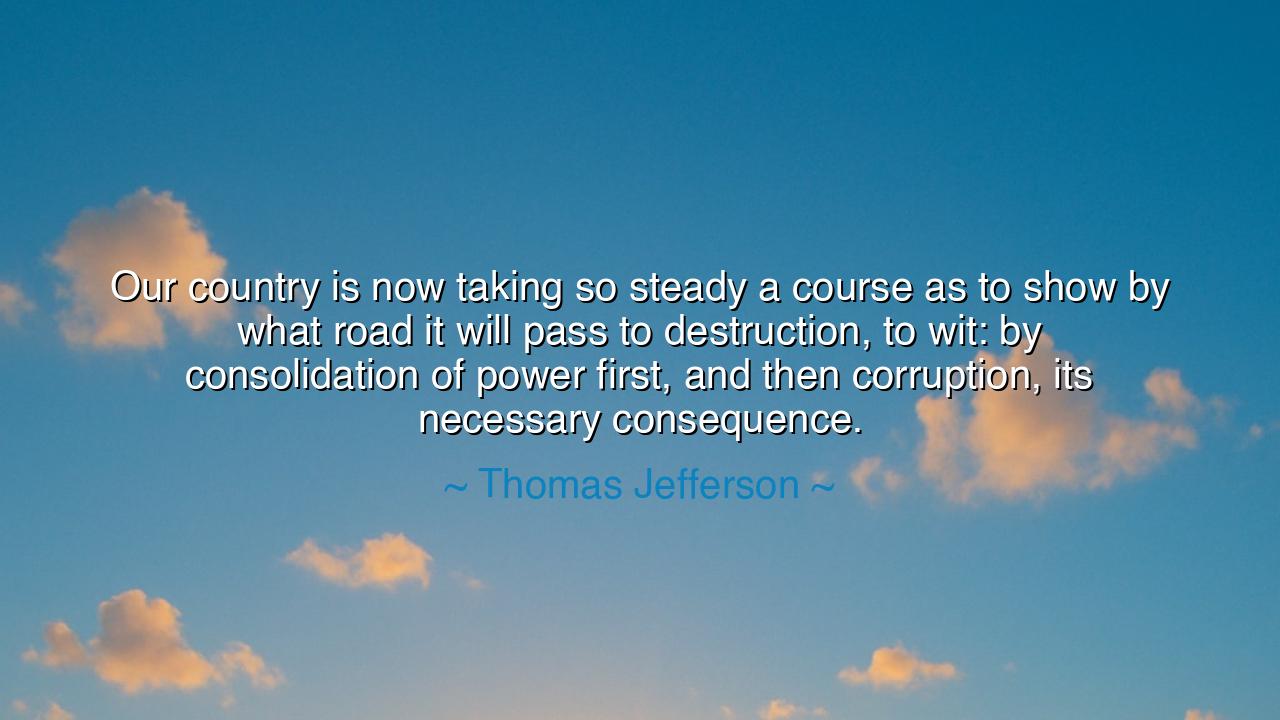
Our country is now taking so steady a course as to show by what
Our country is now taking so steady a course as to show by what road it will pass to destruction, to wit: by consolidation of power first, and then corruption, its necessary consequence.






“Our country is now taking so steady a course as to show by what road it will pass to destruction, to wit: by consolidation of power first, and then corruption, its necessary consequence.” These words from Thomas Jefferson speak to a timeless warning about the danger of unchecked power. The ancient sages, from Plato to Cicero, cautioned that when a nation or ruler consolidates too much power into a single entity, it begins a path toward corruption, for the nature of absolute power is to corrupt. Jefferson foresaw the downfall of a nation not through external invasion, but through internal decay, when those entrusted with the welfare of the people become intoxicated by their own power, leading to their inevitable moral collapse.
In ancient Rome, Julius Caesar was a figure who epitomized the dangers of the consolidation of power. As the Roman Republic began to crumble under the strain of its own size and complexity, Caesar emerged as a leader, initially promising to restore order. Yet, as he amassed more and more power, he ultimately betrayed the ideals of the Republic. His crossing of the Rubicon and subsequent declaration as dictator for life marked the final blow to the Roman Republic’s democracy. Caesar's corruption was the inevitable consequence of the power he had concentrated in his hands. His reign, though initially hailed as a solution to Rome’s chaos, sowed the seeds for the eventual fall of the Roman Empire.
Jefferson's warning is echoed in the history of many empires, where the centralization of authority led to a loss of virtue and integrity. Napoleon Bonaparte, a man once hailed as the liberator of France, became a dictator as he consolidated power in his own hands. His ambition, once focused on the greater good of his nation, spiraled into corruption, as he sought to expand his empire beyond reasonable limits, driven by ego and a sense of invincibility. Napoleon’s downfall came not from the strength of his enemies, but from the internal rot caused by his own consolidation of power.
Jefferson's insight can also be observed in the modern world, where many democratic nations have veered toward authoritarianism in the face of perceived crises. The consolidation of power by a few elites or leaders often begins under the guise of national security or economic stability, but gradually erodes the freedoms and checks that once defined the system. The danger lies in the allure of efficiency in governance, where individual rights are traded for the promise of security, only to find that once the power is concentrated, it becomes increasingly difficult to reverse the process.
Thus, Jefferson's words serve as a dire reminder: the cycle of power and corruption is a self-perpetuating one, unless we remain vigilant. The ancient philosophers, much like Jefferson, understood that the moral strength of a republic lies not in the concentration of authority but in the wisdom of its people to restrain it. The people must always remain the ultimate check on power, for once that balance is lost, corruption inevitably follows.
In the end, let us heed Jefferson’s caution and the lessons of history, understanding that power, when concentrated, becomes a seed of corruption that grows unchecked. The fate of a nation lies in its ability to preserve freedom, to distribute authority wisely, and to guard against the seduction of absolute control. Let us learn from the fall of empires and strive to uphold the values of liberty, equality, and justice, for only in this way can we avoid the path to destruction.






LVLinh Vu
This quote raises a complex ethical and philosophical question: is corruption an unavoidable consequence of concentrated power, or can moral and institutional checks break the cycle? How do citizens recognize early signs of this trajectory and respond effectively? I wonder whether Jefferson’s perspective is more a prediction of human nature or a critique of specific political structures, and how his warning resonates with contemporary governance challenges.
THNguyen Thanh Ha
I feel a strong sense of urgency in Jefferson’s observation, and it makes me reflect on current political systems. Are there subtle signs today of power consolidation that could lead to corruption as he warns? How do social, economic, or technological changes impact this cycle? Could the same warning apply not only to nations but also to institutions, corporations, or other centers of authority?
HPHrieu pro
This statement prompts me to think critically about the balance between centralized authority and accountability. How much power concentration is too much, and at what point does oversight fail? I’m curious about the mechanisms Jefferson might have envisioned to prevent this path to destruction. Can constitutional design, civic engagement, or transparency realistically counteract the corrupting effects of power, or is vigilance the only safeguard?
NHNgan Ha
Reading this, I feel both alarmed and intrigued. Jefferson seems to suggest that power inevitably leads to corruption, but I wonder if that is a universal truth or a warning specific to his time. Are there historical examples where consolidation of power did not lead to corruption? If so, what factors prevented it? Conversely, how can modern democracies guard against this trajectory without stifling effective governance or decisive leadership?